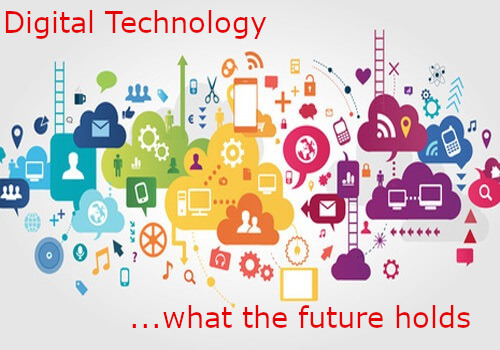The future of digital technology
Today more than ever we are living in a world that is digital and many things we have taken for granted are now turning to digital. This revolution in digital technology started with the microchip and the computer, it then found its way into music, telephony, broadcast (air & tv), internet etc. It continues to penetrate into areas that have politicians scratching their head, namely bitcoin, 5G, smartphones and online giants like Amazon. An arrival of a new dawn of digital technology has the potential to shape the very life we live in and these changes will have huge social changes, including monetary, government, environment.
Think about it, we are already seeing sweeping changes in the way we live our lives through digital technology and you may not even know it. For example, we transact online for banking and buying goods, we talk to loved ones over the phone, we have household goods that are programmed digitally, we drive cars with computer chips for their brains, the list is endless. With the recent pandemic of the Coronavirus, many of us are working remotely which is only through the digital technologies we already have in place. This trend is likely to continue. If the giant online retailer Amazon had it’s ways, it would allow humans to do most of their businesses online, providing goods online and even shipping goods via drones.The sky is the limit.
The question is where do we go from here and what does the future lie for all of us living in this highly technological world.
Despite the fanciful nature of digital technology, one has to understand that the global economy is run by people, trade, profit and the distribution of goods. So basically, digital technology has to bring benefits to those areas. Already we can see the decline in retail shops as the online businesses accelerate in terms of number of users shopping online. We are now facing the hard truths that petrol driven cars will be phased out and replaced with electrical vehicles and with super powered chips on board will provide for autonomous vehicles. This should reduce accidents and deaths on the road, make for more efficient road congestion and and improvement to the environment. Virtual 3D will offer unprecedented growth in some industries such as the medical, remote working for hazardous and labor intensive areas which will only give rise to robots, IOT (internet of things) and build a more efficient society. However, there is something fundamentally broken with the capitalistic society and this has to give eventually to a new era of working and being governed for the good of mankind. Read this interesting post of how capitalism can translate into something much more efficient for mankind benefiting both society and the government. The post talks about the merging of AI (artificial intelligence) and Block chain technology. Both have naturally evolved from the research and development which naturally progressed from the technical digital breakthroughs from the last 2 decades.
The advancements in the last decades have been such that the shaping of the way we work, play and interact has taken on a whole new meaning. We will have free time as a result and have more times to spend with families and friends. However, there is some downside to all of this and this appears in the form of addiction ie. social platforms like facebook, proliferation of online games, less outdoor activity, increased family isolation leading to depression etc. It is up to a balanced and empathetic Government to put the appropriate measures and provide incentives to stop us from dehumanizing ourselves from the slavish traits of technology. Hopefully, there will be a bright future in this marvelous digital revolution that has much more in store for us.




 Digital Canvas
Digital Canvas
can i buy lasix from canada
cialis plux dapoxetine online ordering
online kamagra mumbai
viagra and marijuana
canadian pharmacy cialis